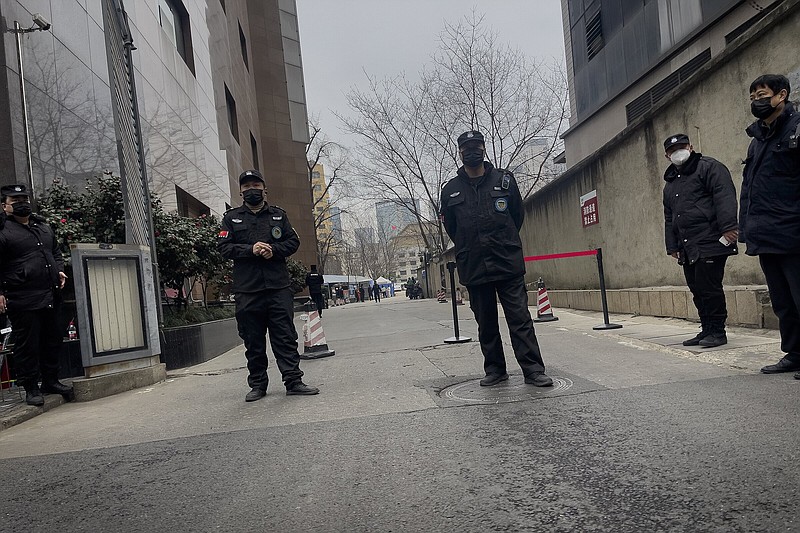CHENGDU, China -- Some investors in a troubled trust fund in China are facing financial ruin under a government plan to return a fraction of their money, casualties of a slump in the property industry and a broader economic slowdown.
Sichuan Trust, based in the southwest city of Chengdu, announced it was insolvent in 2020, stricken by sketchy accounting and failed investments in shopping malls and other projects. A deadline earlier this month to accept a 20%-60% "haircut" or loss on their investments has left some investors in deep financial trouble, according to public announcements and AP interviews with five people affected.
China's economy, the world's second largest, depends heavily on real estate development to drive growth and create jobs. Property prices and sales have languished after a crackdown on what leaders viewed as dangerous levels of borrowing, causing dozens of developers to default on their debts.
At the National People's Congress session in Beijing last week, officials pledged to do more to protect investors. Premier Li Qiang said China would work to control risks and resolve the property crisis.
For the people who put their life savings into Sichuan Trust and similar entities, it's likely too late. Around 300 of more than 8,000 investors refused to accept a government plan and are looking for legal help, a relative of one investor said. A few who attempted to come to Beijing during the congress to air their grievances were blocked by police, the relative said.
The ruling Communist Party faces a dilemma: Debt is a problem, but falling home prices lead people to scrimp on spending. That squeezes companies' sales, so they lay off workers and cut back on investment. The result: slowing growth and less wealth to go around.
Inevitably, someone will end up losing out as China's debt crisis unwinds, said Tsinghua University finance professor Michael Pettis.
"Nobody wants to absorb the loss. If you assign it to households, you weaken consumption even more," Pettis said. "It's got to be assigned. And that's the political problem."
Trusts are a cross between a bank and an investment fund. Some advertised their offerings as reliable, high interest government-backed accounts. They're actually private entities that fund projects like factories and shopping malls. Weak disclosure requirements allowed them to use money from new investors to pay what they owed earlier ones, a set-up somewhat like a Ponzi scheme.
"Financial supervision was relatively loose in the past, so the design of these products, including systems for protecting investors' rights and interests, had serious issues," said Zhu Zhenxin, chief analyst at Rushi Finance Institute in Beijing. "If underlying assets of financial products won't generate enough returns to pay such high interest rates, default is inevitable."
The troubles at Sichuan Trust first surfaced when the government began restricting new sales of trust products in 2020. Without revenue from new investors, it couldn't pay its outstanding debts.
That summer, Sichuan Trust announced it had $3.5 billion in debts it couldn't repay. The provincial government and banking regulators took control, ousting the management, reorganizing its books and opening an investigation.
Hundreds of investors staged weekly protests outside the company's headquarters and their losses became a political issue.
In 2021, police detained Sichuan Trust's majority shareholder Liu Canglong, a mining and real estate tycoon who was once the richest man in Sichuan, a province of more than 80 million people. He is accused of embezzling trust funds.
In December, the trust announced it would return investors' funds according to a sliding scale of the original investment. The larger the investment stake, the larger the loss.
That sparked more protests.
"We're extremely anxious," one investor who asked not to be named told The AP. "It's so cruel, the amount of money they're giving us is so little."
A person answering Sichuan Trust's hotline said the company does not take interviews and would not provide comment. Sichuan Trust, the Sichuan provincial government and the China Banking and Insurance Regulatory Commission did not respond to faxed and emailed requests for comment.
The plan to return funds "appropriately favors small and medium-sized investors," Sichuan Trust said earlier in a public statement, calling it "fair."
Those protesting fear say they've been harassed and intimidated, subjected to police interrogations and threats from their children's employers. They've been barred from leaving Chengdu or, at times, their housing compounds.
On a recent visit to the company's headquarters, dozens of uniformed officers, half a dozen police vehicles and an empty bus were parked outside. More than a dozen plainclothes agents who refused to identify themselves followed two AP journalists around.
Earlier, a Dutch journalist was shoved to the ground and forced into a police vehicle when he tried to approach protesting investors.
"They abduct you, they threaten your children," said another investor, who also did not want to be identified for fear of more police harassment. "They have so many dirty tricks."
Information for this article was contributed by Elaine Kurtenbach of The Associated Press.
